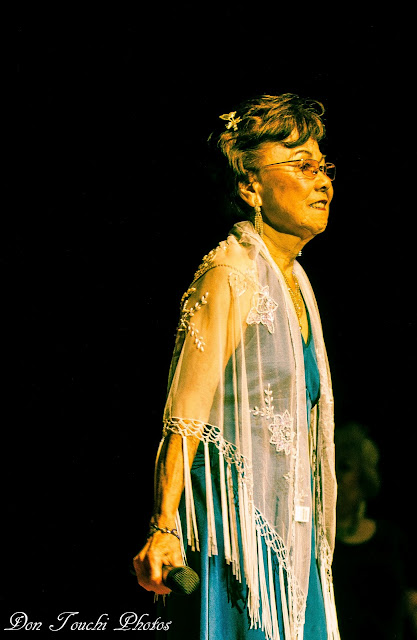It has long been believed that music is an effective method of treating physical, emotional, social and mental problems that individuals have. One person goes a step further and uses music as a means to help to prevent such problems from occurring. Or, at least to delay the effects of aging.
Such a person is Aiko Sekiguchi, a renown singer from Japan.
Aiko has been in Hawaii for many years, having entertained at Oasis Nightclub during the 1960s to owning her own club called Koisan. About 1985, she decided that she should share her talents by teaching others the joy of singing and music. And thus, she opened her karaoke school.
She immediately attracted some notable and prominent citizens in the community who joined one of her five weekly classes.
Some were businessmen who joined grudgingly because their wives wanted to sing. And they themselves later became accomplished singers.
Some just enjoy performing in front of others. Others will never become singers. But they all look forward to going to classes once or twice a week to share in the camaraderie with other class members.
Others are very good and attend as many as three classes each week. Of course, some attend because they bring lots of food and the social interaction is as important or more important than the singing.
Most of Aiko's students are in their 60s, 70s and 80s. Their love of music and their singing keeps them young forever.
Aiko does not provide formal therapeutic sessions for her students. They are all self-motivated and use music to heal and keep themselves healthy. Music helps in the affliction of autism, Alzheimer's and Parkinson's diseases.
Once every two years or so, Aiko holds a recital so that her students can strut their stuff in front of family and friends. This year, it was held at Pearl City High School Performing Arts Center. The facility holds 800 people.
The planning, organizing and the preparations took a lot of effort by all the members. Some had never used a computer before but became very proficient at it after it was over.
Most were very nervous before the performance. Others looked upon it as an opportunity to perform and milked it for whatever they could.
In most cases, music is the difference between withdrawal and awareness, between isolation and interaction, between chronic pain and comfort and between demoralization and dignity.
Dale Senaga guided everyone in putting the show together. http://malamakupuna.blogspot.com/2010/05/dale-senaga.html
Aiko Sensei has five classes every week. Classes are located from downtown all the way to Wahiawa. Join the fun. And make some life-long friends.














No comments:
Post a Comment